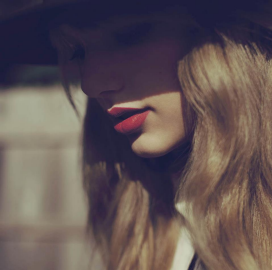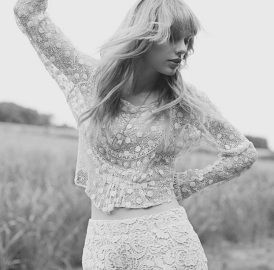Taylor Swift
Red
Taylor Swift has left the country for the city. Sleepy ballads like “I Almost Do” resemble her earlier work, and there are hints at her lineage in the way she drawls out the word “hipster” on “22” and in Red’s minor, token flourishes. Yet Swift has taken a decisive step towards the popular canon in a move that mirrors Springsteen’s Born In the USA in intent and reception, if not quality. Swift has always been radio-friendly and inoffensive, but her latest record has even more crossover appeal embedded in its 16 tracks. On superlative top 40 digests “22” and “I Knew You Were Trouble,” Swift pushes her well-established creative identity to its limits. Elsewhere, the propulsive “Holy Ground” and “Starlight” embody a more natural progression that is just as thrilling. As is her trademark, Taylor Swift’s song writing focuses on what seems to be a disproportionate amount of earth-shattering relationships which nearly always end up shit. Her consistent vulnerability and eye for telling detail has worked well before, drawing listeners into her teenage world with a charm and ease that made her romantic misadventures almost universally relatable. But Swift’s graduation from confessional, adolescent musings is a difficult one, mired in the sort of awkward and inconsistent catalogue of similes that open the title track. Red strives to be a big album, both in length and anthemic scope, established by the lead off track, the U2-esque “State of Grace.” Yet the album fails to fly the way it should. It’s bloated, stifled by tracks perhaps born of a fear of alienating early fans who might not like Swift’s new direction, songs that lack the urgency and vitality of the rest of the album. Red clocks in at 60 drawn-out minutes when it should be a no-filler 42. With some trimming, especially two forgettable late album duets, this could be a great 11 or 12-track pop record instead of what plays like a singles/outtakes anthology. Hopefully Red is a transitional album, a tentative first step away from her early work toward something more kinetic and compelling.
Taylor Swift
Red
Taylor Swift began her career as one in a long list of wide-eyed, country-oriented pop projects. It’s easy to file away these teenage sensations when they proclaim their heartbreak to the world instead of scribbling in their diaries, because to most of the adult world, the tears on their guitars act seem frivolous and immature. But in many ways, Red is Taylor Swift’s first adult pop record. Where her self-titled debut and sophomore release Fearless was the works of a uniquely-gifted teenage singer with a knack for confessional songwriting and soaring melodies, parts of “Speak Now” felt like a boring game of “name that celebrity breakup.” Her music, while improving slightly, was filled with passive-aggressive lyrics better suited for a note passed in secondary school rather than on a Billboard-topping album. Fans of gossip will undoubtedly have an entertaining time trying to crack the code of which heartbreaking ex-boyfriend goes with which track on Red, but this time Swift is playing that information closer to the chest. She’s becoming even more unforgiving of the long trail of ex-boyfriends she’s left behind, with each album taking a different musical step outwards, perhaps more so than any other country music today. However, Red is sometimes unfocused and falters in a few places. Her duet “The Last Time” with Snow Patrol’s Gary Lightbody lacks chemistry, and “22” sounds like a immature, deliberately bland Ke$ha rip-off. Whatever you think of her emotional baggage and boy-crazy sensibilities—and many marvel at their simplicity and sincerity—it’s apparent after listening to her give everything she’s got on Red’s closer “Begin Again” that she’s a strong singer who shows potential that one day she could be a strong lyricist too. If she can patch up her songwriting as much as she’s improved her voice over the past six years, that won’t be the case much longer. Nevertheless, the progression of Swift’s journey into the world of adult pop begins with Red.
Taylor Swift
Red
Red is Taylor Swift’s fourth studio album and her most diverse by far. Swift’s album is similar to her other albums with a plethora of break-up songs with a few love songs mixed in. She really uses this album to test the boundaries of her music. Swift’s first single from the album “We Are Never Ever Getting Back Together” broke records for Swift and became the song of the summer. In the song “I Knew You Were Trouble” the chorus shows a different side of Swift as she tries her hand at dub-step. She does two collaborations on the album: “Everything Has Changed” with Ed Sheeran and “The Last Time” with Gary Lightbody of Snow Patrol. “Everything Has Changed” is by far the better of the two, Swift and Sheeran’s voices blend together perfectly, whereas Lightbody’s voice and tone clash with Swift’s. “Starlight” is based on Ethel and Bobby Kennedy relationship, which is evidenced in the lyrics “I met Bobby on the boardwalk, summer of ’45.” Swift is known to have a slight obsession with the history of the Kennedy family, so writing about them only seems fitting. Some stands out tracks on the album are “Stay Stay Stay,” “22” and “All Too Well.” “Stay Stay Stay” is particularly interesting because of its light, catchy melody and Swift’s adorable and slightly comical lyrics. “22” is a catchy feel-good song that will be stuck in your head for weeks and is sure to be a number one hit. “All Too Well” allows Swift to show a vulnerable side, with lyrics such as “and I might be okay, but I’m not fine at all” and “so casually cruel in the name of being honest.” This album shows a lot of growth from Swift and leaves little room for disappointment.
Taylor Swift
Red
Past crystallized, futures eulogized, charting the stages (and the stages within the stages) of love, Taylor Swift is both impervious, closed off to voices of contradiction, and permeable, endlessly open to them through story (re)construction. “State of Grace,” Red’s opener, is a current translation of everything Swift is about – “busy lives, changing minds,” opening up the staid momentum of previous albums to added sounds and reverberations, and capturing perhaps the picture through which Red can best be viewed. So much of the tabloid image has subsumed whatever there might be worth talking about with Swift, but here there’s an image of crisscrossed people, the universal “we” before the more frequent “you” address, a picture of every person falling in love and worth at least a glimpse, which from Swift’s perspective always means stories flowing out ceaselessly, packing emotion encapsulations in five minutes and hundreds of words and an always-growing archive of turns of phrase turned song. Identification and reinterpretation, rather than celebrity worship – every Swift song should seem to run the gamut of put-on agony or glorious energy depending on personal state. In the shape of an album, the way love at a shy distance (“I Almost Do”) follows from the very essence of unattachment (“22”) or hate as joy (“We Are Never Ever Getting Back Together”) becomes cheerful pleading (“Stay Stay Stay”) appears as a kind of disingenuousness. But Red or Swift or anything as defined by a single action, personal headline, or moment is ultimately a useless and irrelevant view. These are not stories, self-contained, begin and end and figure it out, but a cumulative colossal monument to everyone as plethoras of gradations of emotion, and ultimately worth acting on. Without that, there is nothing, as the renewal of “Begin Again,” or the awestruck twists and turns of “Holy Ground” go.






